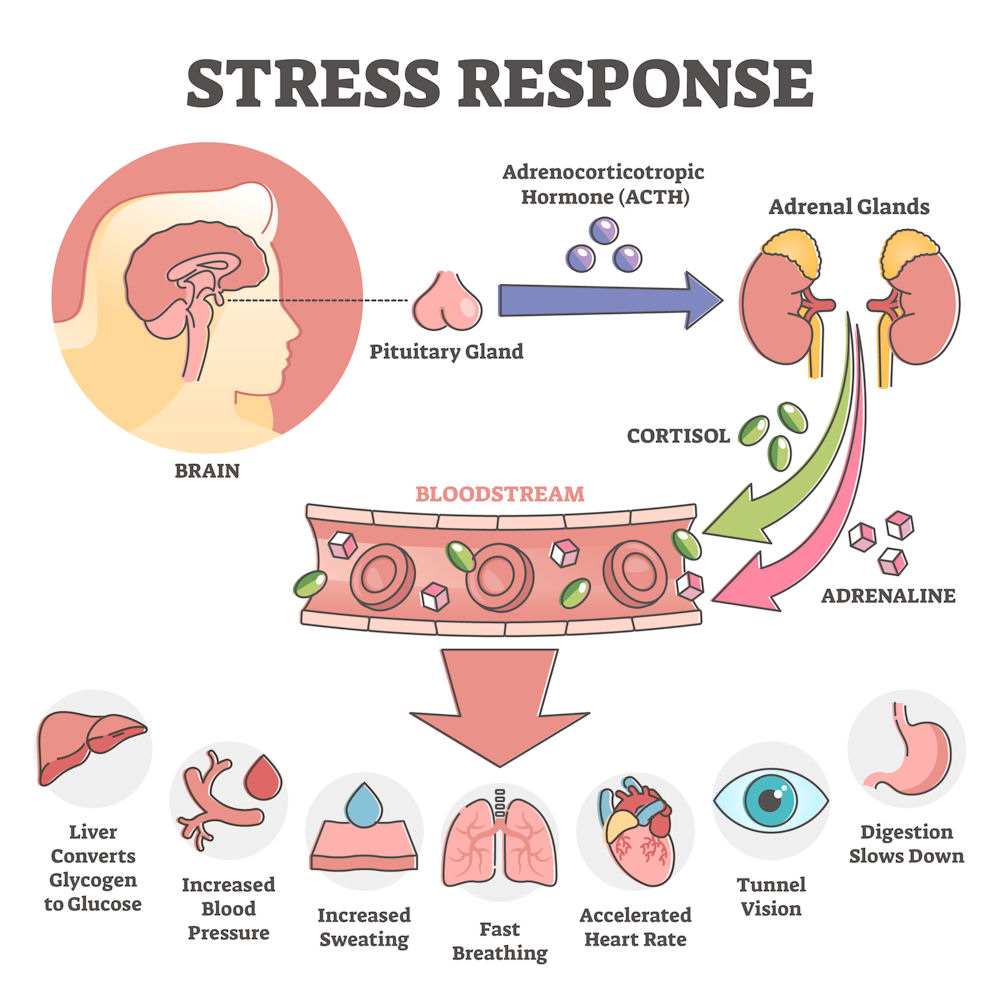Stress can take a heavy toll on the body, and for many, turning to alcohol feels like a temporary relief. However, the relationship between alcohol consumption and cortisol—the hormone responsible for stress regulation—often reveals a vicious cycle. Research shows that drinking alcohol can spike cortisol levels, worsening stress and leading to serious physical and mental health issues over time.
With nearly 14.5 million adults in the U.S. struggling with alcohol use disorder, the need for effective treatment has never been greater. At Laguna Shores Recovery, located in the serene setting of Dana Point, California, we understand how deeply alcohol impacts your body and mind. Our professional detox and residential programs are designed to help individuals break free from the grip of alcohol addiction, promoting lasting recovery and restored health.

The Connection Between Alcohol and Cortisol
The intricate relationship between alcohol consumption and cortisol levels has been the subject of many scientific studies. When we experience stress, our body naturally elevates cortisol levels to help manage the situation. However, the introduction of alcohol into this equation can complicate matters significantly.
What is Cortisol? The Stress Hormone
Cortisol is a steroid hormone produced by the adrenal glands, and it plays a pivotal role in various bodily functions. Its primary function is to help the body respond to stress effectively. Cortisol regulates a wide range of processes in the body, including metabolism, immune response, and blood pressure. Understanding the role of cortisol is essential for recognizing how its levels can be modified by external factors like alcohol.
How Alcohol Influences Cortisol Levels
Research indicates that alcohol consumption can lead to increased cortisol levels in the body. When alcohol is ingested, it can trigger the hypothalamus to stimulate the adrenal glands, leading to enhanced cortisol production. This elevation is often seen in situations of acute drinking, while chronic alcohol use can lead to a dysregulation of cortisol secretion, potentially resulting in long-term health issues.
The timing and extent of alcohol consumption can also affect cortisol response considerably. For instance, moderate consumption during a stressful encounter may lead to temporary relief, but excessive drinking can exacerbate cortisol production over time, leading to deleterious effects on the body. The interplay between alcohol and cortisol is particularly concerning for individuals with pre-existing anxiety disorders, as the combination can create a vicious cycle of stress and alcohol use, further complicating mental health management. If you’re unsure about your symptoms, taking an anxiety disorder test can help identify potential issues early.
Studies have shown that the effects of alcohol on cortisol levels can vary significantly based on individual factors such as genetics, sex, and overall health. Women, in particular, may experience more pronounced increases in cortisol in response to alcohol. For those seeking targeted support, a women’s rehab Orange County program offers specialized care that addresses both alcohol use and the unique challenges women face in recovery. Understanding these nuances is crucial for promoting overall well-being.

The Biological Impact of Alcohol and Cortisol
The impact of alcohol and cortisol has profound biological implications, affecting multiple systems within the body. As cortisol alters physiological functioning, the consequences of alcohol on these levels can lead to significant health problems.
Alcohol can have a detrimental effect on the immune system, especially when combined with elevated cortisol levels. Cortisol is known to suppress the immune response, making the body more susceptible to infections and illnesses. Chronic alcohol consumption, coupled with increased cortisol levels, can result in a weakened immune defense, rendering individuals more vulnerable to health threats. Studies have shown that this combination can lead to a higher incidence of respiratory infections and other communicable diseases as the body struggles to mount an effective response. Additionally, the inflammatory response may be altered, leading to chronic inflammation, which is linked to various long-term health issues, including autoimmune disorders and even certain types of cancer.
The combination of alcohol and elevated cortisol levels can significantly affect mental health. High cortisol levels have been linked to anxiety and depression, and when individuals consume alcohol to cope, they may inadvertently worsen their mental health conditions. Alcohol can provide temporary relief but ultimately may lead to increased feelings of anxiety and depression due to its impact on cortisol levels and mental well-being.
The cycle of using alcohol as a coping mechanism can create a vicious cycle, where the initial relief is followed by increased stress and anxiety when the effects wear off. This pattern can hinder recovery efforts and complicate treatment for those already facing mental health challenges, making it crucial to address both alcohol use and stress management in therapeutic settings.
The long-term consequences of chronic alcohol use paired with elevated cortisol can be severe. These may include metabolic disorders, cardiovascular issues, and a range of psychological disorders. Understanding these risks is essential for individuals who may be struggling with alcohol use, as awareness can prompt healthier choices and lifestyle modifications. Additionally, the cumulative effects of these health issues can lead to a decline in overall quality of life, affecting not only physical health but also social relationships and occupational functioning.
For instance, individuals may find it increasingly difficult to maintain employment or engage in social activities, which can further exacerbate feelings of isolation and despair. Addressing these interconnected issues through comprehensive treatment approaches that incorporate both physical and mental health support is vital for fostering long-term recovery and well-being.
Alcohol, Cortisol, and Stress: A Complex Relationship
The relationship between alcohol, cortisol, and stress is multi-layered and complex. While alcohol may initially seem like a viable solution for stress relief, it often leads to adverse side effects, compounding the very issues individuals seek to escape.
Alcohol as a Coping Mechanism for Stress
Many individuals turn to alcohol as a means to cope with stress, believing that it provides temporary relief from their worries. This is particularly common in high-stress environments or during challenging life transitions. While alcohol may dull the sensations of stress and anxiety in the short term, the aftermath can involve increased cortisol levels, leading to feelings of stress and anxiety when the effects of alcohol wear off. The social context in which alcohol is consumed can also play a significant role; gatherings and celebrations often normalize drinking as a way to unwind, reinforcing the idea that alcohol is a necessary component of relaxation and socialization.
The Vicious Cycle of Stress and Drinking
The interaction between stress and alcohol can create a vicious cycle. As stress increases, so does the likelihood of alcohol consumption. In turn, alcohol can escalate stress levels through its effects on cortisol production, leading to a cyclical pattern that can be difficult to break. This cycle can become particularly dangerous for individuals who rely on alcohol as a coping strategy.
Additionally, chronic alcohol consumption can lead to alterations in brain chemistry, further complicating the relationship between stress and drinking. Over time, the brain may become less responsive to natural sources of pleasure and reward, leading individuals to consume even more alcohol in an attempt to achieve the same effects, thereby deepening their dependence and exacerbating stress levels.
Long-term Consequences of Alcohol Use on Stress
Over time, the long-term consequences of using alcohol as a coping mechanism can be profound. Chronic alcohol consumption can lead to a range of health issues, including liver disease, cardiovascular problems, and mental health disorders. The impact on cortisol levels can also have physiological repercussions, as elevated cortisol is linked to weight gain, immune dysfunction, and other metabolic issues. Individuals may also find that their ability to manage stress diminishes over time, as reliance on alcohol can hinder the development of healthier coping strategies. This can create a sense of helplessness, making it even more challenging to break free from the cycle of stress and drinking.
Strategies to Manage Stress Without Alcohol
Recognizing the detrimental effects of using alcohol as a coping mechanism is crucial for improving mental health and overall well-being. Fortunately, there are effective strategies available that can help individuals manage stress without resorting to alcohol.
Incorporating healthy lifestyle changes can significantly diminish stress levels. Regular physical activity is a powerful stress reliever, as exercise promotes the release of endorphins, which enhance mood and reduce feelings of stress. A balanced diet and adequate sleep are also essential components of overall wellness, helping to regulate cortisol levels and improve resilience to stress.
Psychological techniques such as mindfulness, meditation, and cognitive-behavioral therapy can be incredibly beneficial for managing stress. Engaging in mindfulness practices allows individuals to reconnect with the present moment, reducing feelings of anxiety and overwhelming stress. Additionally, cognitive-behavioral therapy can aid in reshaping negative thought patterns and developing healthier coping mechanisms.


The Role of Medical Intervention
When stress and alcohol use become overwhelming, seeking medical intervention can be a vital step toward recovery. Understanding when it is appropriate to seek professional help can make a significant difference.
If an individual finds that their alcohol consumption has escalated in conjunction with stress, it is important to assess the situation objectively. Signs of alcohol dependence, such as the inability to cut down on drinking, experiencing blackouts, or neglecting responsibilities, warrant professional assistance.
Various treatment options are available for individuals struggling with alcohol dependence and managing stress. These may include individual counseling, support groups, and rehabilitation programs. A healthcare professional can help tailor a plan that addresses both alcohol use and stress management, providing the necessary support for recovery.
Contact Laguna Shores Recovery to Learn More About Alcohol Addiction Treatment
Understanding the link between alcohol and cortisol sheds light on how alcohol doesn’t alleviate stress. Instead, it amplifies it, creating a dangerous cycle that can take a toll on both physical and mental health. Breaking free from alcohol addiction is challenging, but with the right support, recovery is possible. If you or a loved one are trapped in this cycle, professional treatment can provide the tools and guidance needed to rebuild a healthier, more balanced life.
At Laguna Shores Recovery in Dana Point, California, our compassionate team is dedicated to helping you every step of the way. Through personalized detox and residential treatment programs, we empower individuals to overcome addiction and rediscover their inner strength. A future of health, hope, and freedom is within reach—take the first step today.


 Matthew Beck B.A, M.A, LMFT
Matthew Beck B.A, M.A, LMFT 


